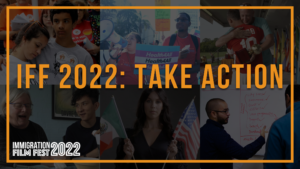
The 2022 Immigration Film Fest is only days away! This year’s Immigration Film Fest explores the nature of home. Is it a place, a safe space, a feeling, a memory, a person, or something more?
The 2022 World Migration Report estimates that in 2020 there were over 281 million people living outside of their country of birth, whether because of forced displacement, climate change, or moving to seek better opportunities. Of that number, the UN estimates that 89.3 million people were forcibly displaced from their homes due to persecution, conflict, and human rights violations. They estimate that nearly half of these forced migrants are children.
Our schedule is live and you can peruse all films under our 7 sub-themes now on Eventive. Don’t forget to get your tickets and passes to this year’s festival, October 13-16!
We don’t want you to just watch our films this year. We want you to learn from them and understand ways that you can take action to support these issues and immigrants in your community and nationally. We encourage you to take a look at the following action steps that you can implement right away, which are tied to our festival’s sub-themes:
The Journey: Seeking a New Homeland
Watch these films as part of our festival:
- One, If By Land
- Tahriib: For those who Travel North
- Un Barco para mi Mama
- A Brief Record of my Father’s Time at Sea
- Ocean Wings
And take these Action Steps:
- Learn more about Border Patrol’s ‘Prevention Through Deterrence’ policy. Learn more.
- Tell Congress to “End Prevention Through Deterrence & Operation Streamline”
- Support Project Safe Haven with the Luminus Network for New Americans
- Volunteer with or donate to one of the many organizations assisting asylum seekers who are being bussed from the border, like Sanctuary DMV. KAMA DC has also collected a resource list for supporting these migrants arriving to the DMV.
- Support community-based organizations that are welcoming asylum seekers who cross the US border and are making their way into the interior. Some of these organizations include: Lutheran Social Services Southwest (Phoenix, Arizona), Annunciation House (El Paso, Texas), Catholic Charities of the Rio Grande Valley (San Juan and Brownsville, Texas), and the Holding Institute (Laredo, Texas).
- Support Non-governmental organizations (NGOs) providing life saving and rescue services to refugees crossing the Mediterranean Sea, including: MOAS, SOS Mediterranee, Open Arms Sea Rescue. More info and organizations here.
Immigrant Activists: Fighting for a New Home
Watch these films as part of our festival:
- GI Jose
- The Garcia Family
- Stop Time (also showing in-person on Oct 14)
- Scattegories
- As American As It Gets
- Cover/Age
- The Neighborhood Storyteller
- The Rest of Us
- My DACA Life (also showing in-person Oct 13)
And take these Action Steps:
- Get more info on becoming a Pro Bono lawyer and support refugee and migrant children in need of legal aid with Kids in Need of Defense (KIND).
- Volunteer with your local refugee resettlement agency, like LSSNCA, and help refugee and migrant families set up and move into their new apartments.
- Check out Every Campus a Refuge and contact your local university about housing refugee and migrant families on campuses.
- 2022 marks the 10-year anniversary of the announcement of the Deferred Action for Childhood Arrivals (DACA) program, but many are still living in the uncertainty of what this temporary status means for them and their future. Join the National Immigration Law Center (NILC)’s petition to Congress demanding permanent status and pathways to citizenship for DACA recipients.
- Support and volunteer with local organizations that offer legal, job, and social services to asylum seekers, including Ayuda, AsylumWorks, Jewish Family Services of San Diego, and the Florence Immigrant and Refugee Rights Program.
- Learn more about how your church or place of worship can serve as a sanctuary for immigrants facing deportation, as seen in our IFF 2022-selected films, Stop Time and The Garcia Family.
- Support black migrants, who are disproportionately impacted negatively by immigration enforcement and policy. Donate bail funds to The Black Immigrants Bail Fund, a national project of the Haitian Bridge Alliance (HBA) and African Bureau for Immigration and Social Affairs (ABISA) with support of other Black led organizations that provides free assistance and relief to black immigrants in pursuit of Liberation and Justice. Their commitment is to eradicate the mass incarceration of black immigrants and level the playing field of equity in due process, transforming one life at a time.
Is My Home Where I Work?
Watch these films as part of our festival:
And take these Action Steps:
- Cook a meal for local migrant workers using the refugee and migrant based cookbook Kitchen Without Borders: Recipes and Stories from Refugee and Immigrant Chefs.
- Support restaurants and catering companies that largely hire refugees and immigrants. Locally in DC you can support and patron Immigrant Food and Foodhini.
- Support and volunteer with organizations that help refugees become reemployed in their original career fields. Check our Upwardly Global!
- Hire refugee and immigrants in your workplace! Check out this guide from the Tent Foundation and the Lutheran Immigration and Refugee Service.
- Support America’s Farmworkers, many of whom are immigrants. Check out the work of Farmworker Justice. There is more interest in food these days than ever, yet there is not enough interest in the hands that pick it. By donating, you will support Farmworker Justice in empowering America’s farmworkers to advocate, navigate and access healthcare resources, labor rights and more!
Refugee Resettlement: Home as a Refuge
Watch these films as part of our festival:
- I Come From Away
- Mango House
- The Heart of Texas
- Operation: Allies Welcome (also showing in-person Oct 14)
- Utica: The Last Refuge
- Island of Hope
- Any Day Now (only showing in-person on Oct 15)
And take these Action Steps:
- The best way to get to know others is to break bread with them. Host a refugee family at your home for dinner. Check out Refugees Welcome to Dinner which is helping facilitate this!
- Donate furniture and home set-up supplies to your local refugee resettlement organization. You can donate furniture and help set up an apartment in the DC-area with Homes Not Borders.
- Learn more about the refugee resettlement and asylum process. Read and share Refugee Council USA’s (RCUSA) guide.
- Apply to be a sponsor with the Asylum Seekers Sponsorship Program or the Community Sponsorship Hub.
- Support, advocate with, or donate to the Refugee Congress, a national nonpartisan organization built and led by former refugees, asylum-seekers, and other vulnerable migrants to promote the well-being and dignity of all vulnerable migrants.
- Tell your Senator or Congress member that you hope they will support the Afghan Adjustment Act because you believe the US has a moral obligation to those who worked with us in Afghanistan to have a pathway to legal status upon resettlement here. You can sign this easy form by HIAS which will go to your Congress member.
Unsettled: Navigating A New Homeland
Watch these films as part of our festival:
And take these Action Steps:
- Learn about various initiatives to welcome and include refugee and immigrant populations through Welcoming America, a nonprofit leading a movement of inclusive communities becoming more prosperous by ensuring everyone belongs, including immigrants. Encourage your community, local organizations, or city to join their network.
- Borders shouldn’t impinge on success – Share information on how refugee and migrant individuals can attend college in the US and integrate into the US higher education system. One resource is Bridging Refugee Youth and Children’s Services (BRYCS), which aims to strengthen the capacity of refugee-serving and mainstream organizations across the U.S. to empower and ensure the successful development of refugee children, youth, and their families. Additionally, some community and state colleges offer information and programs specifically for refugees and immigrants, like the Bluegrass Community and Technical College (BCTC) in Lexington, Kentucky.
- Host a refugee and migrant welcome party or BBQ at a local park. Post flyers, spread the word online and ask everyone to bring a dish from their home country. Then enjoy different foods and get to know your new neighbors!
- No one should experience discrimination or racism based on their nationality, race or sex. Reporta hate crime or bias related incident in your community.
Home is Where the Art is: The immigrant experience seen through culture
Watch these films as part of our festival:
- Dreams of Chonta
- A Letter to Nikola / Lettre a Nikola
- Ljubomir Stanisic: Heartbeat (only showing in-person on Oct 16)
- Los Hermanos / The Brothers
And take these Action Steps:
- When you finish watching films part of the Immigration Film Festival, watch Oscar-nominated movies on the refugee and migrant crisis to better educate yourself and others on this issue.
- Check out books by and about refugees and immigrants. The NY Public Library offers a short list here or this UNHCR-curated list here.
- View the refugee and migrant crisis through the lens of Latin American artists through this UNHCR online exhibit: RefugiArte.
- Support refugee artists! One Journey’s online global marketplace connects you to refugee shops and artisans to purchase from.
- Listen to a Spotify Playlist Made Up Entirely of Songs by Refugee Artists – TIME
Children: Uprooted From Home
Watch these films as part of our festival:
- Kokokids of Paris
- Voices and Locks
- Pipi Thay Too (‘The Grandmother Tree’) (also showing in-person on Oct 13)
And take these Action Steps:
- Fall is near! Host a kids clothing, sock, and coat drive in your neighborhood, then donate to a local refugee resettlement agency or elementary school.
- Write to your local elected leaders and ask they support legislation and policies that protect Unaccompanied Children. Read and share Kids In Need of Defense (KIND)’s policy recommendations.
- Download the Hope for the Southern Border Toolkit from LIRS, which shares more about how you can get involved in helping kids at the border.
- Become a licensed foster family for Unaccompanied Refugee Minors (URM) through a US Conference of Catholic Bishops (USCCB) or Lutheran Immigration and Refugee Service (LIRS) affiliate.
Thank you!!

